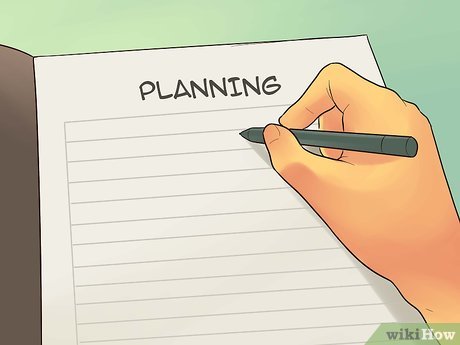How to Defend Your Decision Not to Go to College
Method 1 of 3:
Explaining Your Reasons
-
 Point out that going to college doesn't guarantee more money. Depending on the field you'd like to go into, a college degree just might not guarantee that you make more money than non-college graduates. This is especially true if you would be majoring in the creative arts, like creative writing or painting.[1]
Point out that going to college doesn't guarantee more money. Depending on the field you'd like to go into, a college degree just might not guarantee that you make more money than non-college graduates. This is especially true if you would be majoring in the creative arts, like creative writing or painting.[1]- You can say something like 'Well, I'm really interested in pursuing a career in music, but the employment rate for music school graduates isn't much different than the one for non-graduates. So college just doesn't make much sense for me.'
-
 Explain that you can't afford going to college. College tuition is a lot more expensive than it was even ten years ago. That can make it hard to afford to go to even moderately priced colleges. If your parents can't afford to help you and you're not willing to take on student debt, it's perfectly acceptable to explain that college just isn't financially realistic for you right now.[2]
Explain that you can't afford going to college. College tuition is a lot more expensive than it was even ten years ago. That can make it hard to afford to go to even moderately priced colleges. If your parents can't afford to help you and you're not willing to take on student debt, it's perfectly acceptable to explain that college just isn't financially realistic for you right now.[2]- For example, you can say something like, 'The colleges with programs I was interested in have pretty high tuitions, and it's not something that financially possible right now.'
- Some people might then push you to apply for financial aid, or loans, or try to make you feel like affordability isn't a big deal because you'll get a job later. It's perfectly okay to keep repeating 'It's just not a possibility for me.' When it comes to you and your family's finances, you don't owe anyone an explanation.
-
 Emphasize that there are other paths. Not everyone needs to go to a four-year university to have a shot at a good career later in life. If you're interested in fields like informational technology, healthcare, or manufacturing, trade school can give you the skills to enter the workforce sooner than a four-year degree would.[3]
Emphasize that there are other paths. Not everyone needs to go to a four-year university to have a shot at a good career later in life. If you're interested in fields like informational technology, healthcare, or manufacturing, trade school can give you the skills to enter the workforce sooner than a four-year degree would.[3]- For example, you can say something like, 'Well, I'm really interested in informational technology, especially hardware architecture! So a trade school is actually a really great option for me instead of college, because it will give me the skills I need to succeed and get me into a job faster.'
-
 Give a polite non-answer. It can be really stressful to have to defend your decision about college, especially when everyone is going to be asking you about it as you go through your senior year. A polite non-answer gives you something to say without having to have a lengthy conversation with someone you might not know very well.[4]
Give a polite non-answer. It can be really stressful to have to defend your decision about college, especially when everyone is going to be asking you about it as you go through your senior year. A polite non-answer gives you something to say without having to have a lengthy conversation with someone you might not know very well.[4]- For example, if someone asks if you're going to college, instead of saying 'no,' you can say something like, 'I have a lot of options at the moment and I'm taking some time to look at all of them so I can make a good decision.'
Method 2 of 3:
Finding Alternatives to College
-
 Explore job options before you graduate. There are plenty of jobs you can do with only a high school diploma. To defend your decision not to go to college, it's best to explore those options before you graduate, so you can defend your decision not to go to college by listing the jobs you'll be applying for.
Explore job options before you graduate. There are plenty of jobs you can do with only a high school diploma. To defend your decision not to go to college, it's best to explore those options before you graduate, so you can defend your decision not to go to college by listing the jobs you'll be applying for.- For example, electrical power line installers and repair workers, millwrights, industrial machinery mechanics, community health workers, physical therapist aides, restaurant workers, and hospitality managers are all jobs that only require a high school diploma and some on-the-job training.
-
 Apply for part- or full-time jobs in retail or service. Applying and interviewing for jobs can take a few weeks. If you're looking to make some money while you figure out your next steps or apply for jobs that require some training, consider working in retail or service. You'll likely get hired quickly and won't need any training.
Apply for part- or full-time jobs in retail or service. Applying and interviewing for jobs can take a few weeks. If you're looking to make some money while you figure out your next steps or apply for jobs that require some training, consider working in retail or service. You'll likely get hired quickly and won't need any training. -
 Contact advisors at vocational or technical schools. If you're thinking about attending a vocational or technical school instead of a four-year college, talking to an advisor who is familiar with the programs offered at those schools can be really helpful. They can tell you what courses you'll need to take, what their admissions requirements are, and what sort of employment rate their graduates have.[5]
Contact advisors at vocational or technical schools. If you're thinking about attending a vocational or technical school instead of a four-year college, talking to an advisor who is familiar with the programs offered at those schools can be really helpful. They can tell you what courses you'll need to take, what their admissions requirements are, and what sort of employment rate their graduates have.[5]- There should be an admissions page on the websites of the schools you're interested in. You can usually find contact information for advisors there, or you can make an appointment to see someone in person.
- Start your email by saying: "Dear Ms. Smith, I am considering applying to your school's IT program, but I have a few questions first. I'm available next Wednesday and Thursday between 10 am and 2 pm. Can we set up a time to meet? Thank you!"
-
 Talk to people who didn't go to college. Everyone has heard the stories about super rich and successful people who never went to college. To help you figure out an alternative path after high school, talk to people you actually know who didn't go, and ask them lots of questions. It can help you find something fulfilling that you never knew existed.
Talk to people who didn't go to college. Everyone has heard the stories about super rich and successful people who never went to college. To help you figure out an alternative path after high school, talk to people you actually know who didn't go, and ask them lots of questions. It can help you find something fulfilling that you never knew existed.- For example, you can say something like, 'Uncle Jerry, I know you didn't go to college after high school. Could you talk to me about it? What made you decide not to go? What did you do instead?'
Method 3 of 3:
Making a Plan for What's Next
-
 Talk with your parents. Telling your parents you don't want to go to college can be really scary. Lay out your reasons for not wanting to go and then tell them you'd like their help in making a different plan for your life after high school.
Talk with your parents. Telling your parents you don't want to go to college can be really scary. Lay out your reasons for not wanting to go and then tell them you'd like their help in making a different plan for your life after high school.- Start the conversation by saying, "Mom and Dad, I wanted to talk to you about my plans for after high school. I know you always really wanted me to go to college, but I'm not sure if that's the right path for me. I was hoping we could talk about my options."
-
 Lay out 5 and 10 year plans. If you don't plan on attending college, sit down and write a plan for where you want to be in five years and then ten years. Write down what you want to be doing, where you want to be living, and how much money you want to be making.[6]
Lay out 5 and 10 year plans. If you don't plan on attending college, sit down and write a plan for where you want to be in five years and then ten years. Write down what you want to be doing, where you want to be living, and how much money you want to be making.[6]- Your plans can be as detailed or as general as you like - just make sure they have goals that you can strive for. For example, list each year of the next 5 or 10, and then under the year list the things you want to have accomplished each year. They can be large or small.
- Your five year plan might include where you want to be in school, when you want a promotion at work, or how much money you want to be able to save each year.
- Find a supportive network. If a lot of your friends are planning to go off to college, you might feel a little abandoned, or like no one understands what your experience will be like. Look for people in similar situations, or rely on friends who are remaining in the area, to support and spend time with you after the summer is over.
Share by
David Pac
Update 24 March 2020
You should read it
- ★ How to Finish College Fast
- ★ How to Enroll at a Community College
- ★ Taking Bill Gates as a model, many young people racing to quit college to become billionaires but not everyone knows the truth about his study.
- ★ The app helps you choose a career, choose a school and know the salary
- ★ 6 lessons I learned after 6 years of college









